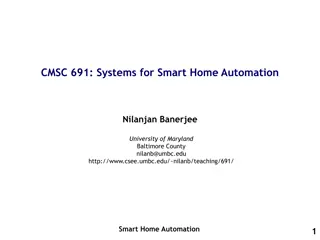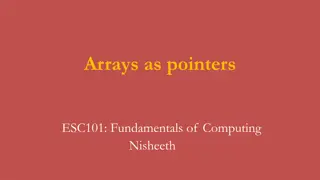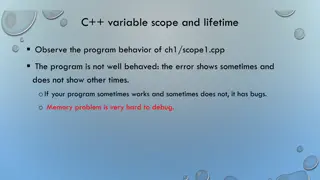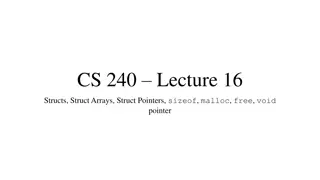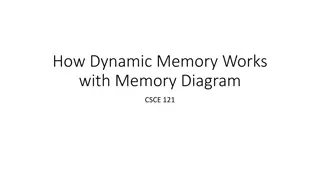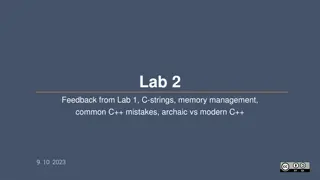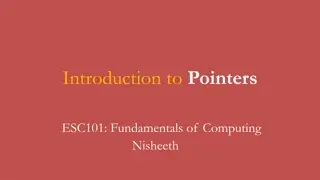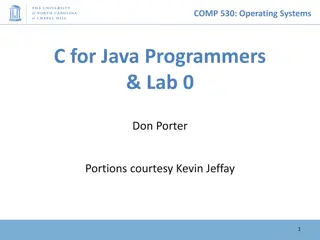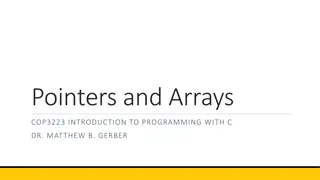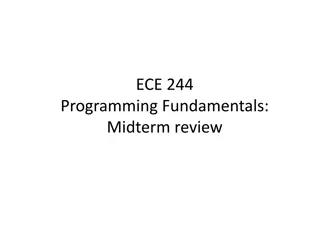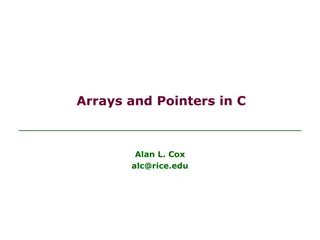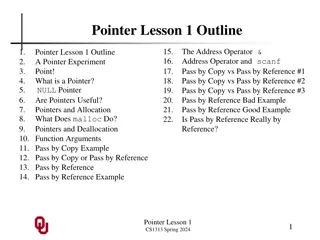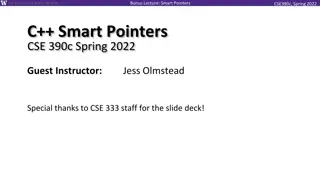Pointer and Reference Conventions in C++ Programming
Understanding the conventions for passing pointers and references in C++ is crucial for safe and effective programming. Different forms allow various levels of control, from read-only access to modification rights, each signaling a specific intent. These conventions help prevent unexpected behavior and guide how objects are used and manipulated in the code.
Download Presentation

Please find below an Image/Link to download the presentation.
The content on the website is provided AS IS for your information and personal use only. It may not be sold, licensed, or shared on other websites without obtaining consent from the author. Download presentation by click this link. If you encounter any issues during the download, it is possible that the publisher has removed the file from their server.
E N D
Presentation Transcript
Pointer/references C++ allows several ways of passing links to objects smart pointers C-like pointers references Technically, all the forms allow almost everything At least using dirty tricks to bypass language rules Pointers require different syntax wrt. references By convention, the use of a specific form signalizes some intent Conventions (and language rules) limits the way how the object is used Conventions help to avoid "what-if" questions What if someone destroys the object I am dealing with? What if someone modifies the contents of the object unexpectedly? ...
Passing a pointer/reference in C++ - conventions What the recipient may do? For how long? What the others will do meanwhile? Modify the contents and destroy the object As required Nothing (usually) std::unique_ptr<T> Modify the contents As required Read/modify the contents std::shared_ptr<T> Modify the contents Until notified to stop/by agreement Read/modify the contents T * Read the contents Until notified to stop/by agreement Modify the contents const T * Modify the contents During a call/statement Nothing (usually) T & Steal the contents Nothing T && Read the contents During a call/statement Nothing (usually) const T &
Multiple values in contiguous memory NPRG041 Programming in C++ - 2019/2020 David Bedn rek 4
Arrays and tuples Homogeneous (arrays) Polymorphic (tuples) // modern: container-style static const std::size_t n = 3; std::array< T, n> a; // structure/class struct S { T1 x; T2 y; T3 z; }; S a; Fixed size a[ 0] = /*...*/; a[ 1].f(); a.x = /*...*/; a.y.f(); // native arrays (avoid!) static const std::size_t n = 3; T a[ n]; // for generic access std::tuple< T1, T2, T3> a; std::get< 0>( a) = /*...*/; std::get< 1>( a).f(); a[ 0] = /*...*/; a[ 1].f(); std::size_t n = /*...*/; std::vector< T> a(n); std::vector< std::unique_ptr< Tbase>> a; a.push_back( std::make_unique< T1>()); a.push_back( std::make_unique< T2>()); a.push_back( std::make_unique< T3>()); Variable size a[ 0] = /*...*/; a[ 1].f(); a[ 1]->f(); NPRG041 Programov n v C++ - 2019/2020 5 David
Array and tuple layouts std::array< T, 3> or T[ 3] struct { T1 x; T2 y; T3 z;} or std::tuple< T1, T2, T3> T T T T1 T2 T3 std::vector< T> std::vector< std::unique_ptr<Tbase>> T T T T2 T1 T3 NPRG041 Programov n v C++ - 2019/2020 6 David
Smart pointers and containers number of elements storage ownership move copy array<T,N> fixed N inside (unique) by elements by elements optional<T> unique_ptr<T> 0/1 unique N.A. individually allocated shared_ptr<T> shared sharing unique_ptr<T[]> unique N.A. contiguous block shared_ptr<T[]> shared sharing transfer of ownership vector<T> several contiguous blocks any deque<T> unique by elements individually allocated other containers NPRG041 Programov n v C++ - 2019/2020 7 David
Smart pointers and containers number of elements insert/erase elements random access storage allocation (en masse) array<T,N> fixed, N (when constructed) N.A. [i] inside optional<T> .emplace(...) unique_ptr<T> 0/1 = make_unique<T>(...) N.A. individually allocated shared_ptr<T> = make_shared<T>(...) .reset() unique_ptr<T[]> = make_unique<T[]>(n) contiguous block shared_ptr<T[]> = make_shared<T[]>(n) vector<T> [i] may move elements several contiguous blocks any vector<T>(n) or .resize(n) deque<T> individually allocated elements never move other containers no NPRG041 Programov n v C++ - 2019/2020 8 David
STL Containers Generic data structures Based on arrays, linked lists, trees, or hash-tables Store objects of given type (template parameter) The container takes care of allocation/deallocation of the stored objects All objects must be of the same type (defined by the template parameter) Containers can not directly store polymorphic objects with inheritance New objects are inserted by copying/moving/constructing in place Containers can not hold objects created outside them Inserting/removing objects: Member functions of the container Reading/modifying objects: Iterators
STL Sequential containers New objects are inserted in specified location array< T, N> - fixed-size array (no insertion/removal) vector< T> - array, fast insertion/removal at the back end stack< T> - insertion/removal only at the top (back end) priority_queue< T> - priority queue (heap implemented in vector) basic_string< T> - like a vector, convertible to const char * string = basic_string< char> u32string = basic_string< char32_t> deque< T> - fast insertion/removal at both ends queue< T> - FIFO (insert to back, remove from front) forward_list< T> - linked list list< T> - doubly-linked list
STL Associative containers New objects are inserted at a position defined by their properties sets: type T must define ordering relation or hash function maps: stored objects are of type pair< const K, T> type K must define ordering or hash multi-: multiple objects with the same (equivalent) key value may be inserted Ordered (implemented usually by red-black trees) set<T> multiset<T> map<K,T> multimap<K,T> Hashed unordered_set<T> unordered_multiset<T> unordered_map<K,T> unordered_multimap<K,T>
STL - Ordered Containers Ordered containers require ordering relation on the key type Only < is used (no need to define >, <=, >=, ==, !=) In simplest cases, the type has a built-in ordering std::map< std::string, my_value> my_map; If not built-in, ordering may be defined using a global function bool operator<( const my_key & a, const my_key & b) { return /*...*/; } std::map< my_key, my_value> my_map; If global definition is not appropriate, ordering may be defined using a functor struct my_functor { bool operator()( const my_key & a, const my_key & b) const { return /*...*/; } }; std::map< my_key, my_value, my_functor> my_map; If the ordering has run-time parameters, the functor will carry them struct my_functor { my_functor( bool a); /*...*/ bool ascending; }; std::map< my_key, my_value, my_functor> my_map( my_functor( true));
STL - Unordered containers Hashed containers require two functors: hash function and equality comparison struct my_hash { std::size_t operator()( const my_key & a) const { /*...*/ } }; struct my_equal { public: bool operator()( const my_key & a, const my_key & b) const { /*return a == b;*/ } }; std::unordered_map< my_key, my_value, my_hash, my_equal> my_map; If not explicitly defined by container template parameters, hashed containers try to use generic functors defined in the library std::hash< K> std::equal_to< K> Defined for numeric types, strings, and some other library types std::unordered_map< std::string, my_value> my_map;
STL Iterators Each container defines two member types: iterator and const_iterator using my_container = std::map< my_key, my_value>; using my_iterator = my_container::iterator; using my_const_iterator = my_container::const_iterator; Iterators act like pointers to objects inside the container objects are accessed using operators *, -> const_iterator does not allow modification of the objects An iterator may point to an object inside the container to an imaginary position behind the last object: end()
STL Iterators void example( my_container & c1, const my_container & c2) { Every container defines functions to access both ends of the container begin(), cbegin() - the first object (same as end() if the container is empty) end(), cend() - the imaginary position behind the last object auto i1 = begin( c1); // also c1.begin() c*() always returns const_iterator auto i2 = cbegin( c1); // also c1.cbegin() auto i3 = cbegin( c2); // also c2.cbegin(), begin( c2), c2.begin() Associative containers allow searching find( k) - first object equal (i.e. not less and not greater) to k, end() if not found lower_bound( k) - first object not less than k, end() if no such object upper_bound( k) - first object greater than k, end() if no such object my_key k = /*...*/; auto i4 = c1.find( k); // my_container::iterator auto i5 = c2.find( k); // my_container::const_iterator Iterators may be shifted to neighbors in the container all container iterators allow shifting to the right and equality comparison for ( auto i6 = c1.begin(); i6 != c1.end(); ++ i6 ) { /*...*/ } bidirectional iterators (all except forward_list and unordered_*) allow shifting to the left -- i1; random access iterators (vector, string, deque) allow addition/subtraction of integers, difference and comparison auto delta = i4 - c1.begin(); // number of objects to the left of i4; // my_container::difference_type === std::ptrdiff_t auto i7 = c1.end() - delta; // locate the same distance from the opposite end; // my_container::iterator if ( i4 < i7 ) auto v = i4[ delta].second; // same as (*(i4 + delta)).second, (i4 + delta)->second }
STL Iterators Caution: Shifting an iterator before begin() or after end() is illegal for (auto it=c1.end()-1; it>=c1.begin(); --it) // ERROR: underruns begin() for (auto it=c1.rbegin(); it!=c1.rend(); ++it) // CORRECT: reverse iterator Comparing iterators associated to different (instances of) containers is illegal if ( c1.begin() < c2.begin() ) // ILLEGAL Insertion/removal of objects in vector/basic_string/deque invalidate all associated iterators (except for some cases explicitly mentioned in the documentation) The only valid iterator is the one returned from insert/erase std::vector< std::string> c( 10, "A"); auto it = c.begin() + 5; // the sixth A std::cout << * it; auto it2 = c.insert(c.begin() + 2, "B"); std::cout << * it; // always ILLEGAL // may CRASH if insert needed to reallocate it3 = it2 + 4; // the sixth A c.push_back( "C"); std::cout << * it3; // may CRASH A A A A A A A A A A A A A A A A A A A A it A A B A A A A A A A A A A B A A A A A A A A it3 it2 A A B A A A A A A A A C
STL Insertion/deletion Containers may be filled immediately upon construction using n copies of the same object std::vector< std::string> c1( 10, "dummy"); or by copying from another container std::vector< std::string> c2( c1.begin() + 2, c1.end() - 2); Expanding containers - insertion insert - copy or move an object into container emplace - construct a new object (with given parameters) inside container Sequential containers position specified explicitly by an iterator new object(s) will be inserted before this position c1.insert( c1.begin(), "front"); c1.insert( c1.begin() + 5, "middle"); c1.insert( c1.end(), "back"); // same as c1.push_back( "back");
STL insertion/deletion insert by copy slow if copy is expensive std::vector< std::vector< int>> c3; not applicable if copy is prohibited std::vector< std::unique_ptr< T>> c4; insert by move explicitly using std::move auto p = std::make_unique< T>(/* */); c4.push_back( std::move( p)); implicitly when argument is rvalue (temporal object) c3.insert( begin( c3), std::vector< int>( 100, 0)); emplace constructs a new element from given arguments c3.emplace( begin( c3), 100, 0);
STL insertion/deletion Shrinking containers - erase/pop single object my_iterator it = /*...*/; c1.erase( it); c2.erase( c2.end() - 1); // same as c2.pop_back(); range of objects my_iterator it1 = /*...*/, it2 = /*...*/; c1.erase( it1, it2); c2.erase( c2.begin(), c2.end()); // same as c2.clear(); by key (associative containers only) my_key k = /*...*/; c3.erase( k);
Range-for loop for ( typevariable : range ) statement; range is anything that has begin() and end() most often used with universal reference and a container: for ( auto && variable : container ) statement; may be used to modify the contents of the container by modifying the variable is by definition equivalent to { auto && R = range; auto B = begin(R); auto E = end(R); for (; B != E; ++ B) { type variable = * B; statement; } } // or R.begin() if it exists // or R.end() if it exists






